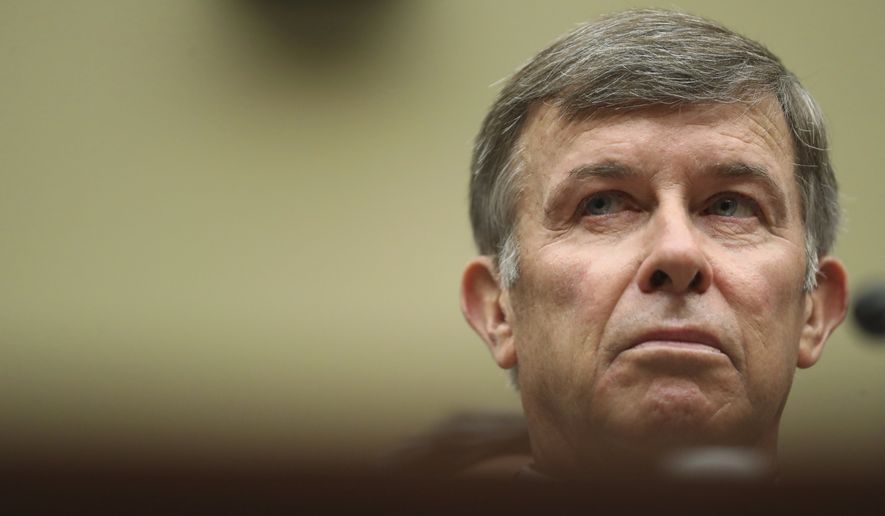Acting Director of National Intelligence Joseph Maguire said Thursday that nobody ordered him to withhold a whistleblower’s complaint about President Trump from Congress, and he said he worked as quickly as possible to get the information to lawmakers — and they now have it.
Mr. Maguire said it was only after Mr. Trump declassified and waived executive privilege over the transcript of notes of his conversation with Ukraine’s president that he was able to share everything with lawmakers.
“It was not stonewalling, I did not receive direction from anybody,” the longtime public servant testified to Congress, bristling at complaints he was acting to politically shield the president. “I have to comply with the way the law is, not the way some people would like it to be.”
“The White House did not — did not — direct me to withhold information,” he added.
The whistleblower complaint has roiled Washington, spurring House Democrats to announce an impeachment inquiry into the president. They said not only did Mr. Trump appear to break the law in his call with Ukraine, but delaying production of the complaint to Congress also broke the law.
Republicans said Democrats acted even before seeing the actual whistleblower complaint or even the transcript of the call between Mr. Trump and Ukraine’s president.
The transcript was released Wednesday and undercut some of Democrats’ contentions.
It showed the president did pressure Ukraine to conduct an investigation into a political opponent, former Vice President Joseph R. Biden. But Mr. Trump did not offer any quid pro quo in the conversation, undercutting the whistleblower’s suggestions.
Mr. Maguire said he doesn’t know the identity of the whistleblower, but said the allegations he or she made were based on “second-hand information.”
And he bristled at accusations that he himself broke the law by not sharing the information with Congress earlier, saying that he’s had a long history of nonpartisan service in the military and the intelligence community and would not stand for being accused as a partisan hack.
“In my nearly four decades of public service my integrity has never been questioned until now,” Mr. Maguire told the House intelligence committee in a high-stakes hearing. “I have upheld my responsibility to follow the law every step of the way in the matter that is before us today.”
He also said whatever the back and forth of the last few weeks, Congress now has what it needs.
“It may have taken longer than we would have liked, you would have liked, but you have the information,” he said.
Democrats on Capitol Hill say Mr. Maguire was required by law to quickly share that with Congress, and they accused him of attempting to shield Mr. Trump from political danger.
Mr. Maguire, though, said he legally couldn’t share the information with Congress because it contained material that may have been protected by executive privilege, and he had to wait on the White House to make a determination.
Mr. Trump’s declassification and production of the transcript on Wednesday settled that question.
Mr. Maguire also said he consulted the Justice Department’s Office of Legal Counsel, the government’s internal legal advisory branch, which ruled the president isn’t part of the intelligence community and so the DNI didn’t have authority over him, and he wasn’t required to share the complaint.
The Justice Department said Wednesday it, not the intelligence community, was the right place to investigate the complaint — and it concluded there was no violation of campaign finance laws.
The department said that there was no clear thing of value Mr. Trump was soliciting in his conversation with the Ukrainian president, so there couldn’t be a campaign finance issue.
Mr. Maguire refused to offer an assessment of the whistleblower complaint as he stared down a barrage of questions from Rep. Adam B. Schiff, the Democratic chairman of the committee.
“It is not for me to decide,” Mr. Maguire said when asked whether he thought the complaint detailed “serious wrongdoing” by the president.
He also defended holding the whistleblower complaint from Congress, citing a Justice Department opinion that the complaint did not rise to the level of urgent. Therefore it did not necessitate being handed over to Congress.
“My job as director of intelligence is to comply with the Whistleblower Act and adhere to the meaning of ’urgent concern,’ which is a legal definition,” he said.
• Stephen Dinan can be reached at sdinan@washingtontimes.com.
• Jeff Mordock can be reached at jmordock@washingtontimes.com.




Please read our comment policy before commenting.